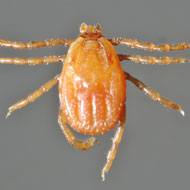
Vets made aware of Hepatozoon canis case
Clinical pathologists are reporting a recent case of the tick-borne disease Hepatozoon canis, in a two-year-old spaniel imported from Cyprus.
The dog had been imported two days before presenting at a UK veterinary practice with dyspnoea, generalised pruritus and a mammary mass. Clinical examination revealed pyrexia, tachycardia and tachypnoea, with increased respiratory effort. Mucus membranes were pale and the coat condition was poor.
A blood sample submitted to Axiom Veterinary Laboratories tested positive for H canis, pathologists report in the Veterinary Record letters. Unfortunately, the dog’s condition worsened and it was euthanised due to severe dyspnoea.
The main vector for H. canis is the brown dog tick, Rhipicephalus sanguineus. Unusually, the infected tick (or infected paratenic host) must be ingested for transmission to occur.
H. canis is not commonly seen in the UK but is prevalent in Southern Europe, Africa, Asia, the Middle East and the USA.
Clinical signs are very variable depending on the organs affected and any concurrent disease (ehrlichiosis, leishmaniosis and babesiosis are common co-infections), among other factors. The level of parasitaemia generally reflects the severity of clinical signs, which may be non-specific, such as fever, lethargy and depression. The prognosis after treatment for dogs with low parasitaemia is typically good.
Niki Skeldon and Jim Klaassen of Axiom wrote in Vet Record: ‘We write to take this opportunity to raise awareness of a disease not commonly seen in the UK, and with which practitioners may be less familiar than some of the other diseases of travelling or imported pets.
‘Furthermore, this is yet another example of the importance of blood film examination; the diagnosis was secured by this simple and cheap technique.’
Image by Alan R Walker/Wikimedia Commons/CC BY-SA 3.0



 RCVS Knowledge has welcomed Professor Peter Cockcroft as editor-in-chief for Veterinary Evidence.
RCVS Knowledge has welcomed Professor Peter Cockcroft as editor-in-chief for Veterinary Evidence.